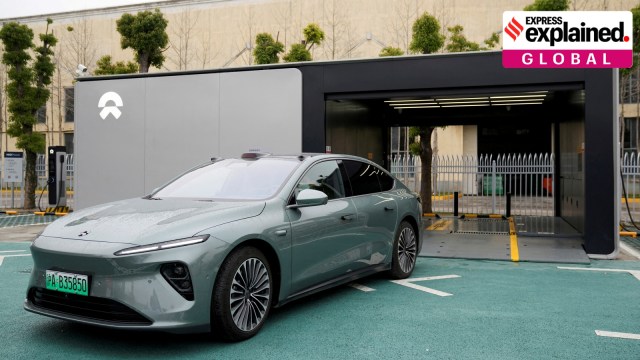- India
- International
Why electric vehicles are at the heart of trade frictions between China and Europe
China's trade issues with the European Union (EU) arise mainly out of friction over exports of cheap Chinese electric vehicles (EVs), and constrained access for European companies to markets in China.
 A staff member of Chinese electric vehicle (EV) maker Nio drives a Nio car as he demonstrates to media about the operation of the new battery swapping station, at a delivery center of the company, in Nanxiang, Shanghai, China March 23, 2023. REUTERS/Aly Song/File Photo
A staff member of Chinese electric vehicle (EV) maker Nio drives a Nio car as he demonstrates to media about the operation of the new battery swapping station, at a delivery center of the company, in Nanxiang, Shanghai, China March 23, 2023. REUTERS/Aly Song/File PhotoPresident Xi Jinping’s first visit to Europe in more than five years — he arrived in France on Monday and will travel to Belgrade on Wednesday and Budapest on Thursday to meet President Aleksandar Vučić and Prime Minister Viktor Orbán respectively — is taking place at a time of increased tensions between China and some European countries over trade barriers and alleged Chinese espionage.
China’s trade issues with the European Union (EU) arise mainly out of friction over exports of cheap Chinese electric vehicles (EVs), and constrained access for European companies to markets in China. Last month meanwhile, six people were charged in Europe with spying for Beijing, and in December 2023, Italy wriggled out of China’s Belt and Road Initiative.
President Xi would like to avoid opening a hostile front with Brussels when it is already in a trade confrontation with the United States. He could sign several deals in France, possibly including fresh orders with French aviation major Airbus.
At the same time, his visits to Serbia and Hungary, countries that have close business and ideological ties with China, is a visible outreach to pockets within the EU where the criticism of China’s support for Russia’s war against Ukraine is far more tempered than in much of western Europe.
The EVs question
Chinese exports to European markets significantly outweigh European exports to mainland China. The EU has complained that unfair market access is a key reason for this situation.

China’s car shipments to foreign markets, and to the EU in particular, have surged in recent years. Last year, the EU opened an investigation into subsidies going into Chinese EVs, which Beijing denounced as an example of “naked protectionism”.
Brussels has also opened separate investigations that could limit Chinese solar exports to the EU, and put restrictions on imports of wind turbines and medical devices.
Days ahead of Xi’s visit, the European Commission (EC) told three big Chinese EV makers that they had failed to supply “sufficient information” to the anti-subsidy investigators. Should the EC conclude that BYD, SAIC, and Geely had not provided all the facts, it could use “facts available” elsewhere to compute tariffs, which could potentially inflate duties on imports of these vehicles into the EU.
This is significant because the EC used the “facts available” in 10 previous anti-subsidy cases against China to fill in certain gaps, which allowed Brussels a free hand to impose higher duties.
The investigation, launched by EC President Ursula von der Leyen last year, coincides with declining (though still sizable) exposure in China for European companies, including carmakers Volkswagen of Germany and Renault of France. Beijing on its part has launched its own anti-dumping investigation into imports of European brandy — a measure against France, which is said to have lobbied for the EV probe.
Fear of Chinese flood
China-made EVs are projected to make up more than a quarter of all EV sales in Europe in 2024, with the country’s share in the market increasing by more than 5 percentage points from a year earlier.
According to the Brussels-based European Federation for Transport and Environment (T&E), an umbrella entity for non-government organisations in the field of transport and the environment in Europe, nearly 20% of battery-powered EVs sold in the EU last year were from China. In France and Spain, close to a third of all EVs sold were shipped from China.
The share of Chinese-made vehicles in the EU is expected to rise to more than 25% in 2024, according to the T&E report, as brands such as BYD and SAIC step up their global expansion plans.
The majority of foreign EVs currently sold in the EU are from Western brands such as Tesla, which manufactures and ships from factories in China.
More Explained
EXPRESS OPINION
May 19: Latest News
- 01
- 02
- 03
- 04
- 05































